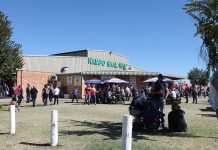A group of farmers in the Eastern Cape, seeking compensation for being forced to sell their land for homeland consolidation under apartheid, will square off against the Land Claims Commission in court.
The case involves about 25 farmers who argue they were not offered market-related prices for their land. hey are among about 60 white farmers whose claims were rejected by the commission.
Most had land incorporated into the former homelands of the Transkei and Ciskei in the Eastern Cape, and Lebowa in Limpopo. Chief land claims commissioner Tozi Gwanya insisted he is not discriminating against whites by opposing their claims. he Restitution Act allows anyone who lost land rights through racially motivated laws or practices to lodge a claim, provided they weren’t fairly compensated. “If whites were removed to create homelands, then this meets the [Act’s] criteria of racially motivated dispossession.
The law does not distinguish between black and white.” But the commission argues most whites were handsomely rewarded for leaving their farms. this can be proved, they’re automatically disqualified under the act. he commission will be using the Eastern Cape farmers as a test case. It plans to argue the apartheid government wanted to promote its homeland policy without alienating white voters, and will rely on testimony from contemporary valuers.
Most farmers forced to sell were offered market value plus solatium or tranegeld – a consideration to compensate them for emotional distress – and the same courtesy was not extended to black victims of racial dispossession, said Gwanya. his was confirmed by a former Ciskei official involved in taking over white farms for the homeland government. “They got market value plus 30% solatium,” said the ex-official. “Compare that to black freehold farmers [removed from SA] who were promised land in the homeland and never got it.”
Farmers’ union Agri SA disagrees. “These are definitely valid claims because the farmers were not adequately compensated,” said provincial president Cerneels Pietersen. he union has set up a fund to help its members fight the case. Farmers will probably call valuers and former officials to testify that whites who refused to sell ended up in isolated pockets and were eventually forced to accept lower offers as the value of their land declined. hey are likely to rely on two previous cases won by white landowners.
In 2003 Charles Randall and Andrew Knott became the first to receive payouts for unfair expropriation under apartheid after reaching a negotiated settlement ratified by the court. In the second case, the court ruled that the late Rudolf Opperman was entitled to compensation after the apartheid government forced him to sell his farm at below market value. The commission is appealing this ruling. A date for the hearing has not yet been set. – Stephan Hofstätter








